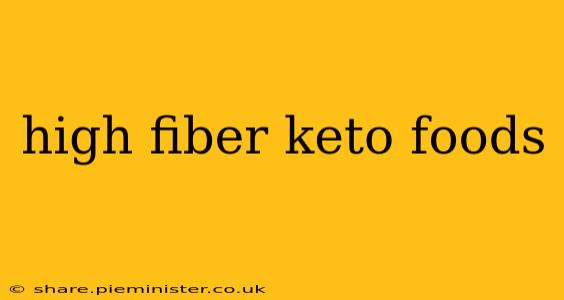The ketogenic diet, known for its high-fat, moderate-protein, and very-low-carbohydrate approach, often gets a bad rap for its potential to cause constipation. While it's true that drastically reducing carbohydrate intake can initially impact gut regularity, incorporating high-fiber keto foods can help mitigate this and offer a plethora of other health benefits. This isn't about abandoning the keto principles; it's about strategically choosing foods that support both your macro goals and your digestive health.
What are the benefits of fiber on a keto diet?
Fiber, often overlooked, is crucial for a healthy gut microbiome. It acts as a prebiotic, feeding beneficial bacteria that contribute to better digestion, improved immunity, and even enhanced mental well-being. On a keto diet, where many processed foods are eliminated, prioritizing fiber becomes even more important. Sufficient fiber intake helps prevent constipation, a common complaint among those new to keto. Moreover, fiber promotes satiety, helping to manage hunger and cravings – a significant advantage in sticking to a ketogenic lifestyle.
What are some good sources of high fiber on keto?
It's a common misconception that keto and fiber are mutually exclusive. The key is understanding which types of fiber to include and how to incorporate them into your macros. Soluble fiber dissolves in water, forming a gel-like substance that can help regulate blood sugar and cholesterol. Insoluble fiber, on the other hand, adds bulk to your stool, preventing constipation. Aim for a balance of both types.
Here are some excellent sources of high-fiber keto foods:
-
Avocado: Packed with healthy fats and fiber, avocados are a keto staple. One medium avocado contains around 10 grams of fiber.
-
Chia Seeds: These tiny seeds are nutritional powerhouses, brimming with fiber (about 10 grams per ounce) and omega-3 fatty acids. They can be added to smoothies, yogurt (full-fat, unsweetened), or sprinkled on salads.
-
Flax Seeds (ground): Similar to chia seeds, flaxseeds offer a good dose of fiber (about 8 grams per ounce) and healthy fats. Ground flaxseeds are easier to digest than whole flaxseeds.
-
Vegetables (non-starchy): Leafy greens like spinach, kale, and collard greens, along with asparagus, broccoli, cauliflower, and Brussels sprouts, are low in net carbs but relatively high in fiber. Focus on lower-carb options and be mindful of portion sizes.
-
Nuts and Seeds (in moderation): Almonds, walnuts, pecans, pumpkin seeds, and sunflower seeds offer fiber and healthy fats but are calorie-dense, so moderation is crucial. Pay close attention to serving sizes to stay within your daily macronutrient goals.
-
Psyllium Husk: This soluble fiber is a great option for adding bulk to your diet and promoting regularity. It’s virtually carb-free and can be added to water or smoothies. Always drink plenty of water when consuming psyllium husk.
How much fiber should I consume on keto?
There's no single magic number, as individual needs vary based on factors like activity level, gut health, and overall health status. However, a reasonable goal is to aim for at least 20-30 grams of fiber per day, even while following a ketogenic diet. Start slowly to avoid digestive upset, and gradually increase your fiber intake.
Can too much fiber cause problems on keto?
While fiber is beneficial, consuming excessive amounts can lead to digestive discomfort such as bloating, gas, and diarrhea. It's important to increase your fiber intake gradually to allow your gut microbiome to adjust. Drinking plenty of water is crucial when increasing fiber intake to help prevent these issues.
What if I experience digestive issues while on a keto diet?
If you experience constipation or other digestive issues while on a keto diet, it's essential to address the problem proactively. This might involve increasing your water intake, adding more high-fiber keto foods as outlined above, or considering a gentle laxative if necessary (always consult your doctor before taking any laxatives).
Conclusion
Embracing high-fiber keto foods doesn't mean compromising your ketogenic goals. By thoughtfully selecting foods rich in fiber and paying attention to your body's signals, you can reap the many health benefits of fiber while maintaining ketosis and optimizing your overall well-being. Remember to consult with a healthcare professional or a registered dietitian to create a personalized ketogenic plan that aligns with your individual needs and health goals.
